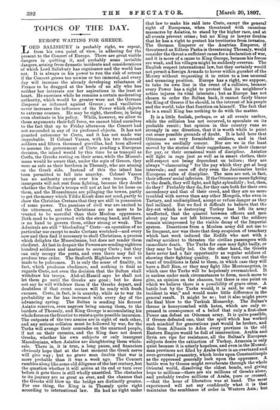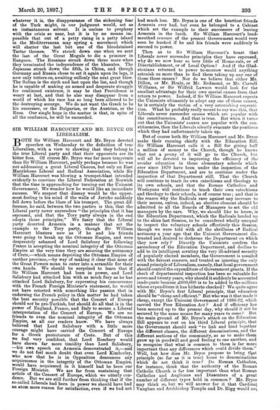TOPICS OF THE DAY.
EUROPE WAITING FOR GREECE. T4ORD SALISBURY is probably right, we repeat, from his own point of view, in adhering for the present to the Concert of Europe. There are great visible dangers in quitting it, and probably some invisible dangers, arising from dynastic incidents and considerations of which Lord Salisbury has cognisance and the world has not. It is always in his power to run the risk of retreat if the Concert grows too unwise or too immoral, and every day will increase the already developing reluctance of France to be dragged at the heels of an ally who has neither her interests nor her aspirations in the least at heart. He exercises while he remains a certain moderating authority, which would be greater were not the German Emperor so inflamed against Greece ; and vacillation never increases the influence of the Power which objects to extreme courses. He may be right, therefore, in being even obstinate in his policy. While, however, we allow to those arguments their full force, we cannot blind ourselves to the fact that up to Friday afternoon the Concert had not succeeded in any of its professed objects. It has not granted autonomy to Crete, and it has not made war improbable. If Colonel Vassos, with his two thousand soldiers and fifteen thousand guerillas, had been allowed to assume the government of Crete pending a European decision, the island would by this time be as tranquil as Corfu, the Greeks resting on their arms, while the Mussul- mans would be aware that, under the ngis of Greece, they were as safe as their brethren in Thessaly, who are arming on the Greek side. Instead of this the island has been permitted to fall into anarchy. Colonel Vassos has no authority except over his own troops. The insurgents will not rest from fighting, because they doubt whether the Sultan's troops will not at last be let loose on them, and the Mussulmans are pillaging the towns, partly to get the money which Yildiz Kiosk does not send,partly to show the Christian Cretans that they are still in possession of some power. The passions of civil war are excited to the uttermost, and the Christians are no more to be trusted to be merciful than their Moslem oppressors. Both need to be governed with the strong hand, and there is no hand to govern them, either strong or weak. The Admirals are still " blockading" Crete—an operation of no particular use except to make Cretans wretched—and every now and then find it necessary to shell Christians, a process which delights the Mussulmans, but does not render them obedient. At last in despair the Powers are sending eighteen hundred soldiers and marines to occupy Crete ; but they can only occupy the ports, and even there may fail to produce true order. The Seaforth Highlanders were not made to be policemen. It is only the sense of finality, in fact, which produces obedience, and nothing is final as regards Crete, not even the decision that the Sultan shall withdraw his troops. Abd-ul-Hamid says he shall not let them go until the Greeks are gone ; but he does not say he will withdraw them if the Greeks depart, and doubtless if that event occurs will be ready with fresh excuses. Crete, in fact, is in anarchy, while as to war its probability so far has increased with every day of the advancing spring. The Sultan is sending his fiercest Asiatic reserves, even negroes being among them, to the borders of Thessaly, and King George is accumulating his whole force on the frontier to resist a quite possible incursion. The outposts of the two armies are in sight of each other, and any serious collision must be followed by war, for the Turks will avenge their comrades on the unarmed people, if not on their enemies, and the King dare not desert Greeks, whether his own subjects or only insurgent Macedonians, when Asiatics are slaughtering them whole- sale. There is, it is true, a long pause, and financiers obviously hope that at the last moment the Greek nerve will give way ; but no grave man doubts that war is more probable than it was a, week ago. The Concert rumbles along like some old diligence of the last century, but the question whether it will arrive at its end or turn over before it gets there is still wholly unsettled. The obstacles to its journey are as great as ever, and the chances that the Greeks will blow up the bridge are distinctly greater. For one thing, the King is in Thessaly quite right according to international law. He had no right under that law to make his raid into Crete, except the general right of Europeans, when threatened with causeless massacres by Asiatics, to stand by the higher race, and at all events prevent crime ; but no King or lawyer doubts that he has a right to protect his territories from invasion. The German Emperor or the Austrian Emperor, if threatened as Edhem Pasha is threatening Thessaly, would consider the threat a sufficient cause for a declaration of war, and it is more of a cause to King George, because his forces are weak, and his villages might be suddenly overrun. The English respect international law, but they certainly would not permit a foreign Armada to hover within gunshot of the Mersey without requesting it to retire to a less unusual and menacing position. Europe has a right, we suppose, to take its own line in the event of a collision, because every Power has a right to protest that its neighbour's action injures its vital interests ; but as Europe has not chosen to order the Sultan back, it cannot fairly blame the King of Greece if he should, in the interest of his people and the world, take that function on himself. The fact that he is a small King has nothing to do with the matter.
It is a little foolish, perhaps, or at all events useless, while the collision has not occurred, to speculate on its probable result; but opinion in this country runs sa strongly in one direction, that it is worth while to point out some possible grounds of doubt. It is held here that Ottomans are very formidable soldiers, and in that opinion we cordially concur. Nor are we in the least moved by the stories of their raggedness, or their clamour for pay, or their occasional want of discipline. Asiatics will fight in rags just as well as in smart clothes, their self-respect not being dependent on tailors ; they are always " clamouring " for the pay which they get at long intervals ; and once off duty even the Janissaries broke European rules of discipline. The men are not, in fact, their officers' social inferiors. If the Ottomans mean fighting to the death, they will fight, and fight splendidly ; but, then, do they ? Probably they do, for they care both for their own ascendency and that of their creed, and they are no more troubled with nerves than any other Mongols, who even in Tartary, and undisciplined, accept or refuse danger as they feel inclined. But we find it difficult to believe that the dry-rot which is destroying Turkey has left its army unaffected, that the quarrel between officers and men about pay has not left bitterness, or that the soldiers remain unimpressed by the visible decay of the Imperial system. Desertions from a Moslem army did not use to- be frequent, nor was there that deep suspicion of treachery which last week induced the Redifs who met with a railway accident to threaten the civilian passengers with immediate death. The Turks for once may fight badly, or they may be badly led. On the other hand, the Greeks have never had a fair opportunity as regular soldiers of showing their fighting quality. It may turn out that the want of traditions is fatal to them, in which case they will have a Bull Run, or they may fight like Montenegrins, in which case the Turks will be hopelessly overmatched. It is useless under such circumstances to form, much more to give, an opinion on the chances, but there is one point on which we believe there is a possibility of grave error. A battle lost by the Turks would, it is said, be only " an incident in war," and would make little difference in the general result. It might be so ; but it also might prove the final blow to the Turkish Monarchy. The Sultan's throne is honeycombed with hates, which are only re- pressed in consequence of a belief that only a first-class Power can defeat an Ottoman army. It is quite possible, if Greece defeated one, that the spell which has worked such mischief for generations past would be broken, and that from Albania to Aden every province in the old Eastern Empire would be full of insurrection. Arabia and Syria are ripe for resistance, all the Sultan's European subjects desire the extinction of Turkey, Armenia is only quiet because it is utterly hopeless, and even in the Mussul- man provinces not filled by Arabs there is an overtaxed and over-governed peasantry, which looks upon Constantinople as the oppressed generally look upon the oppressor. A battle won by Greece might reverberate through the whole Oriental world, dissolving the oldest bonds, and giving hope to millions—there are six millions of Greeks alone, and probably twelve millions of Arabs, pure or crossed. —that the hour of liberation was at hand. The most experienced will not say confidently what it is that maintains the semblance of order in Western Asia ; but whatever it is, the disappearance of the sickening fear of the Turk might, in our judgment would, act as an instantaneous solvent. It is useless to prophesy with the crisis so near, but it is by no means im- possible that out of a petty rising in a petty island in the Mediterranean may spring a movement which will shatter the last but one of the bloodstained Tartar thrones. We struck down one when we sent the last of the Great Moguls to die a prisoner in Rangoon. The Russians struck down three more when they terminated the independence of the khanates. The Japanese struck down the fifth, in China, and though Germany and Russia chose to set it again upon its legs, it now only totters on, awaiting sullenly the next great blow. The Sultan is the sixth and last upon the list, and though he is capable of making an armed and desperate struggle for continued existence, it may be that Providence is weary at last, and that he also may disappear from a world of which his race has so long been allowed to be the destroying scourge. We do not want the Greek to be his successor, or the Bulgarian, or the Austrian, or the Russ. Our single hope in the matter is that, in spite of all the confusion, he will be succeeded.







































 Previous page
Previous page